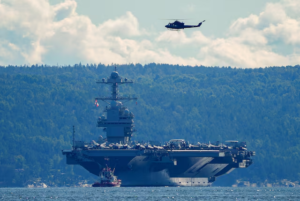Six suspected smugglers of drugs were killed in a US military raid on a vessel off the Venezuelan coast, according to President Donald Trump in a confirmation on Tuesday. The raid is another event in a series of recent military raids that Washington is ramping up as it intensifies the war against drug cartels working in Latin America.
The vessel, Trump claimed, was reportedly connected to “narcoterrorist networks” and was trafficking illegal narcotics between international waters. In a statement posted on Truth Social, the ex-president wrote, “Intelligence established the boat was smuggling narcotics and was connected to illegal narcoterrorist groups,” without specifying what group was involved. No outside evidence has been presented to support the accusation.
A short 30-second video clip released by Trump appeared to show a remaining boat hit by a projectile, followed by an enormous explosion engulfing the boat. The US Department of Defense has not yet published operational details, victim names, or the exact nature of the cargo.
Legal and Strategic Implications
The Pentagon recently informed Congress that the Trump administration has determined the United States is engaged in a “non-international armed conflict” with transnational narcotics cartels. Such a designation would allow U.S. armed forces to use military force under law of armed conflict principles — a development that has sparked controversy among legal scholars.
Some former military lawyers criticized the rationale, arguing that deadly strikes against suspected traffickers in foreign waters—without attempting to arrest or provide due process—could violate international law as well as principles of the law of armed conflict. “Calling drug cartels terrorist organizations may be politically expedient, but it blurs the line between war and law enforcement,” a former Pentagon lawyer stated.
Military Presence and Regional Tensions

The strike comes after a large-scale deployment of American troops in the southern Caribbean. The Pentagon has deployed eight warships and a nuclear submarine in the area, along with F-35 fighter jets stationed in Puerto Rico. Thousands of U.S. sailors and Marines are deployed in the area, which is a sign of renewed American interest in counter-narcotics operations along South America.
The increase has increased diplomatic tensions with Venezuela, whose President Nicolás Maduro has condemned the United States for attempting to destabilize his government. The United States doubled its reward in August to $50 million for tips leading to the arrest of Maduro for involvement in drug trafficking and organized crime — charges that he vehemently repudiates.
Regional and Political Context
Analysts say the new attack might also be part of Trump’s broader strategy of demonstrating American military power overseas and toughness on narcotics and the border — both among his political base. The operations recall earlier policies whereby the U.S. expanded its counterterrorism definition to include drug-trafficking groups, blurring boundaries among criminal law enforcement and military intervention.
For Venezuela, the event would add to domestic upheaval and deepen its foreign isolation. Relations between Washington and Caracas have been tense ever since the U.S. government declared opposition politician Juan Guaidó as Venezuela’s legitimate interim president in 2019, an action Maduro has denounced as foreign interference.
As the inquiry continues, international observers are urging transparency regarding the conduct and adherence to international legal norms. Human rights organizations have pushed for a full report on the strike, including verifications of intelligence claims and estimates of civilian impact.




